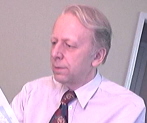
Dr Ladislav Jan Kohout passed away on November 20, 2009, in Malta. As Ladislav’s friend I had the honour of being the best man at his wedding to a Maltese young lady matching his intellectual ability Isabel Stabile in London’s Church of Immaculate Conception in October, 1987. A wedding mass for the occasion was composed by our mutual friend Dr Václav Pinkava and sang by a BBC Choir. Not long afterwards Ladislav and Isabel settled in the U.S.A. where they raised three children. Ladislav was a brilliant scholar in several fields including mathematical logic, artificial intelligence and computer application in medicine.
Together with his friend Wyllis Bandler he devised the knowledge-based system CLINAID, a decision-tool utilizing fuzzy relational structures for knowledge presentation. He spent his last twenty years at the Florida State University in Tallahassee as professor of computer science.
Ladislav Jan Kohout was born in Prague on January 22, 1941. He studied electrical engineering at the Technical University in Prague and achieved the distinguished ‘red diploma’ in 1963. After graduation he worked as an interdisciplinary researcher at the Czechoslovak Academy of Sciences in Prague. When ‘brotherly’ armies of the Soviet Union and its Warsaw Pact allies invaded Czechoslovakia in August 1968, he left the country and was granted political asylum in the United Kingdom. For several years he worked in the medical computing at the Medical School of University of London while pursuing doctoral studies at the University of Essex in Colchester in the area of man-machine studies. After receiving his PhD degree in 1978 he joined the Department of Computer Science at Brunel University in West London as a lecturer. Soon promoted to the rank of Reader, he taught at Brunel until 1988 when an opportunity offered itself at the Florida State University in Tallahassee, which he joined as professor of computer science.
‘In his theoretical work he can rightfully be considered a pioneer in the areas of systems science, non-classical logic, fuzzy set theory a fuzzy interval computing, but he has also made important contributions to knowledge engineering, soft computing, intelligence systems, and some aspects of theoretical computer science’, writes his long term friend and scientific colleague George J Klir, Editor in Chief of the Information Systems Journal where Ladislav was the U.S.Editor. Although Ladislav was a prolific author and wrote dozens of articles as well as several books, he also collaborated with others, among them Dr Vaclav Pinkava and Wyllis Bandler. A substantial amount of work in medicine was done jointly with his wife Isabel, a medical doctor. Their work centred on practical application of mathematical techniques he had conceived such as the automatic formation of interesting hypotheses from incomplete data in acute gynaecologic emergencies. His most important contributions to systems science were in the area of relational systems, both classical and fuzzy. Yet he published only some results of his work in this area. He started to work on the book where he wanted to cover all his results. Unfortunately he was not able to complete the work due to his deteriorating health.
Ladislav was an exceptionally knowledgeable and gifted scientist. He was also a man with broad interests, an accomplished musician and artist. He enjoyed playing a classical guitar, loved classical music and one of his hobbies was a competitive ballroom dancing in which he won several prizes. He was very modest and not many people knew about this. Most of all amongst his friends he was recognized for his personal qualities: he was an honorable man and a faithful friend. He will be sadly missed.
Milan Kocourek,
Walton on Thames
17.1.2010
